Tesco's Business Environment Analysis: PESTLE, SWOT, and Factors
VerifiedAdded on 2023/01/11
|10
|2958
|95
Report
AI Summary
This report provides a comprehensive analysis of Tesco's business environment, focusing on both macro and micro factors. It begins with an introduction to the business environment and then applies PESTLE analysis to examine the political, economic, social, technological, legal, and environmental factors influencing Tesco's operations. The report also includes a SWOT analysis, identifying Tesco's strengths, weaknesses, opportunities, and threats. Furthermore, it explores the interrelationships between internal and external factors, offering insights into how these elements interact to shape Tesco's performance. The analysis covers various aspects, including market share, competition, and the impact of external factors like Brexit. Overall, the report aims to provide a detailed understanding of Tesco's position within the retail sector and the challenges and opportunities it faces.
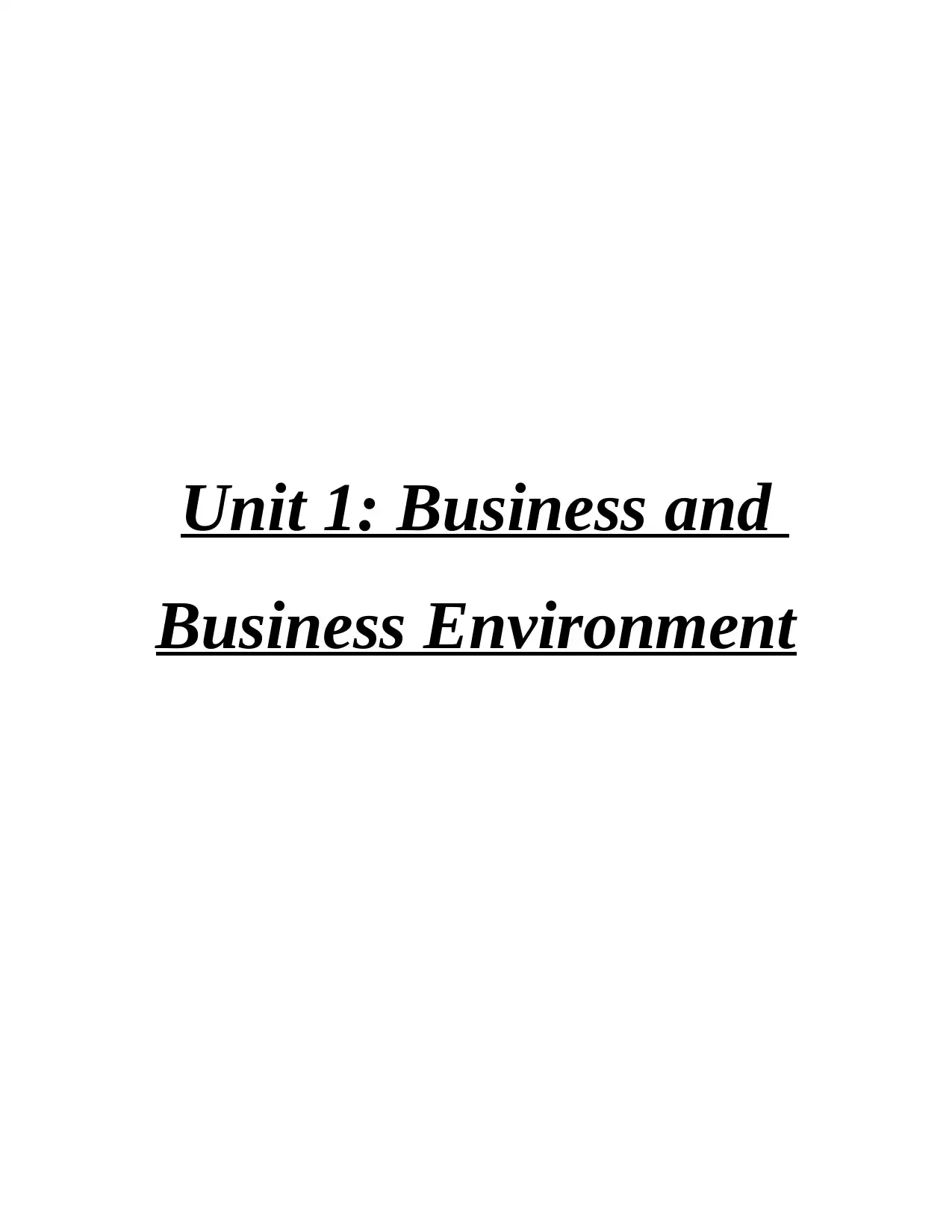
Unit 1: Business and
Business Environment
Business Environment
Paraphrase This Document
Need a fresh take? Get an instant paraphrase of this document with our AI Paraphraser
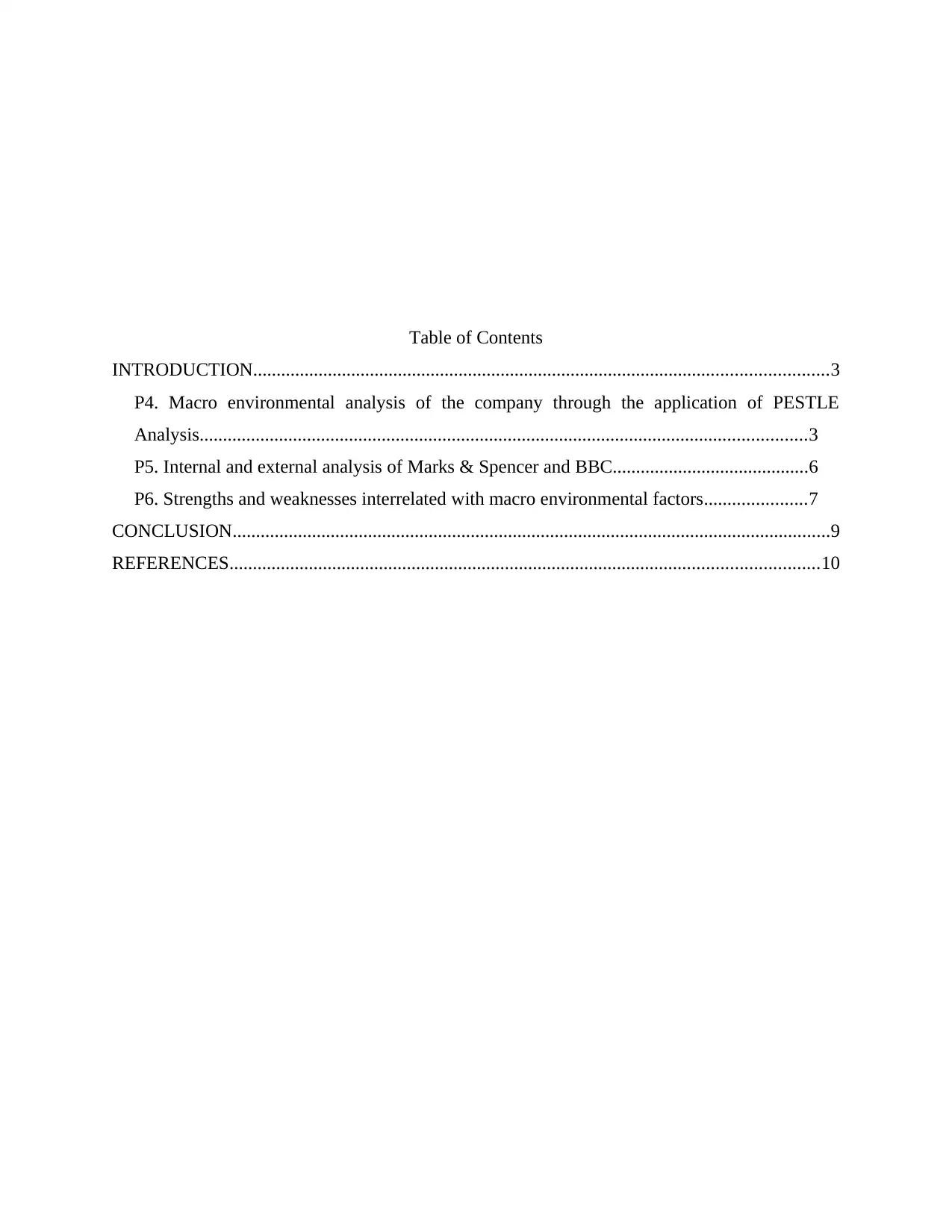
Table of Contents
INTRODUCTION...........................................................................................................................3
P4. Macro environmental analysis of the company through the application of PESTLE
Analysis..................................................................................................................................3
P5. Internal and external analysis of Marks & Spencer and BBC..........................................6
P6. Strengths and weaknesses interrelated with macro environmental factors......................7
CONCLUSION................................................................................................................................9
REFERENCES..............................................................................................................................10
INTRODUCTION...........................................................................................................................3
P4. Macro environmental analysis of the company through the application of PESTLE
Analysis..................................................................................................................................3
P5. Internal and external analysis of Marks & Spencer and BBC..........................................6
P6. Strengths and weaknesses interrelated with macro environmental factors......................7
CONCLUSION................................................................................................................................9
REFERENCES..............................................................................................................................10
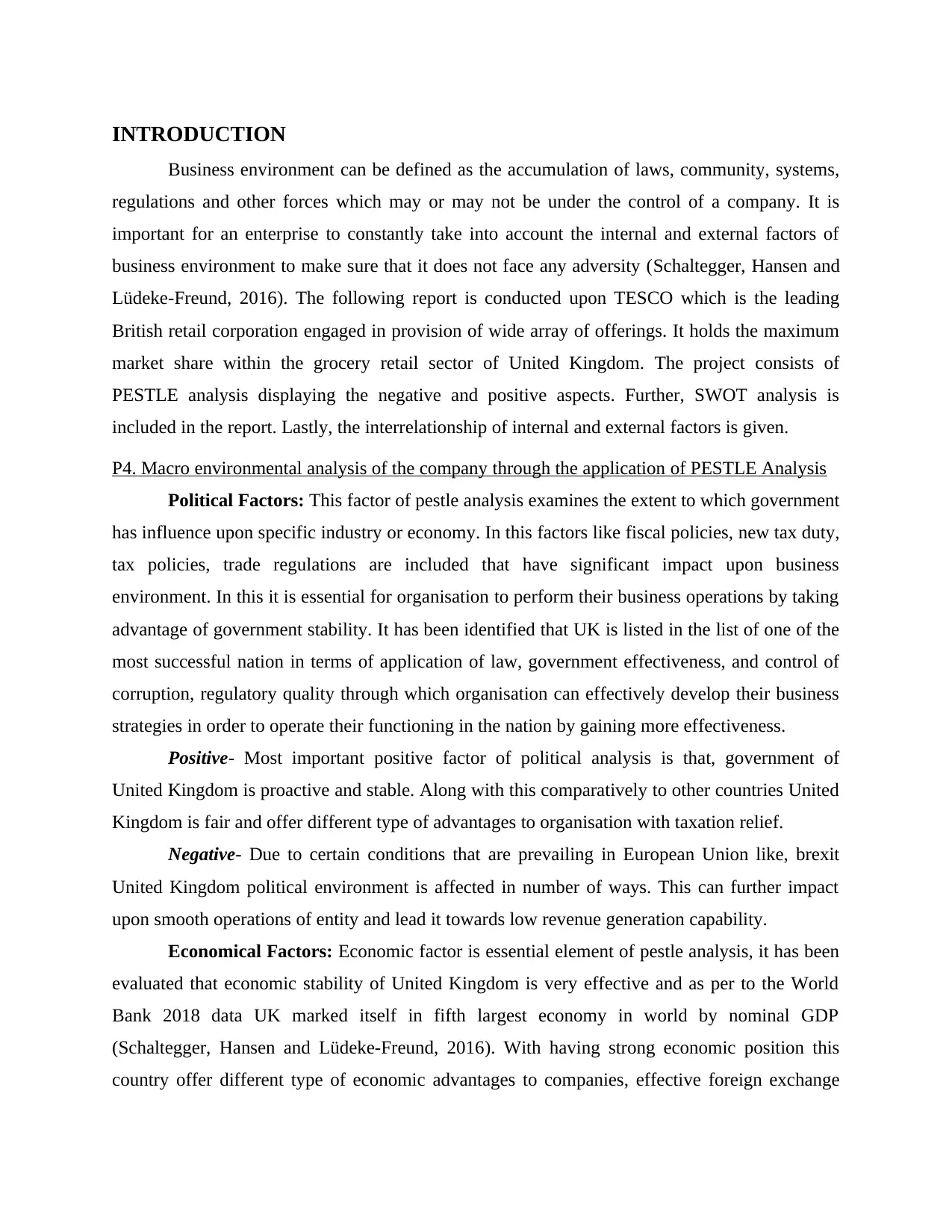
INTRODUCTION
Business environment can be defined as the accumulation of laws, community, systems,
regulations and other forces which may or may not be under the control of a company. It is
important for an enterprise to constantly take into account the internal and external factors of
business environment to make sure that it does not face any adversity (Schaltegger, Hansen and
Lüdeke-Freund, 2016). The following report is conducted upon TESCO which is the leading
British retail corporation engaged in provision of wide array of offerings. It holds the maximum
market share within the grocery retail sector of United Kingdom. The project consists of
PESTLE analysis displaying the negative and positive aspects. Further, SWOT analysis is
included in the report. Lastly, the interrelationship of internal and external factors is given.
P4. Macro environmental analysis of the company through the application of PESTLE Analysis
Political Factors: This factor of pestle analysis examines the extent to which government
has influence upon specific industry or economy. In this factors like fiscal policies, new tax duty,
tax policies, trade regulations are included that have significant impact upon business
environment. In this it is essential for organisation to perform their business operations by taking
advantage of government stability. It has been identified that UK is listed in the list of one of the
most successful nation in terms of application of law, government effectiveness, and control of
corruption, regulatory quality through which organisation can effectively develop their business
strategies in order to operate their functioning in the nation by gaining more effectiveness.
Positive- Most important positive factor of political analysis is that, government of
United Kingdom is proactive and stable. Along with this comparatively to other countries United
Kingdom is fair and offer different type of advantages to organisation with taxation relief.
Negative- Due to certain conditions that are prevailing in European Union like, brexit
United Kingdom political environment is affected in number of ways. This can further impact
upon smooth operations of entity and lead it towards low revenue generation capability.
Economical Factors: Economic factor is essential element of pestle analysis, it has been
evaluated that economic stability of United Kingdom is very effective and as per to the World
Bank 2018 data UK marked itself in fifth largest economy in world by nominal GDP
(Schaltegger, Hansen and Lüdeke-Freund, 2016). With having strong economic position this
country offer different type of economic advantages to companies, effective foreign exchange
Business environment can be defined as the accumulation of laws, community, systems,
regulations and other forces which may or may not be under the control of a company. It is
important for an enterprise to constantly take into account the internal and external factors of
business environment to make sure that it does not face any adversity (Schaltegger, Hansen and
Lüdeke-Freund, 2016). The following report is conducted upon TESCO which is the leading
British retail corporation engaged in provision of wide array of offerings. It holds the maximum
market share within the grocery retail sector of United Kingdom. The project consists of
PESTLE analysis displaying the negative and positive aspects. Further, SWOT analysis is
included in the report. Lastly, the interrelationship of internal and external factors is given.
P4. Macro environmental analysis of the company through the application of PESTLE Analysis
Political Factors: This factor of pestle analysis examines the extent to which government
has influence upon specific industry or economy. In this factors like fiscal policies, new tax duty,
tax policies, trade regulations are included that have significant impact upon business
environment. In this it is essential for organisation to perform their business operations by taking
advantage of government stability. It has been identified that UK is listed in the list of one of the
most successful nation in terms of application of law, government effectiveness, and control of
corruption, regulatory quality through which organisation can effectively develop their business
strategies in order to operate their functioning in the nation by gaining more effectiveness.
Positive- Most important positive factor of political analysis is that, government of
United Kingdom is proactive and stable. Along with this comparatively to other countries United
Kingdom is fair and offer different type of advantages to organisation with taxation relief.
Negative- Due to certain conditions that are prevailing in European Union like, brexit
United Kingdom political environment is affected in number of ways. This can further impact
upon smooth operations of entity and lead it towards low revenue generation capability.
Economical Factors: Economic factor is essential element of pestle analysis, it has been
evaluated that economic stability of United Kingdom is very effective and as per to the World
Bank 2018 data UK marked itself in fifth largest economy in world by nominal GDP
(Schaltegger, Hansen and Lüdeke-Freund, 2016). With having strong economic position this
country offer different type of economic advantages to companies, effective foreign exchange
⊘ This is a preview!⊘
Do you want full access?
Subscribe today to unlock all pages.

Trusted by 1+ million students worldwide
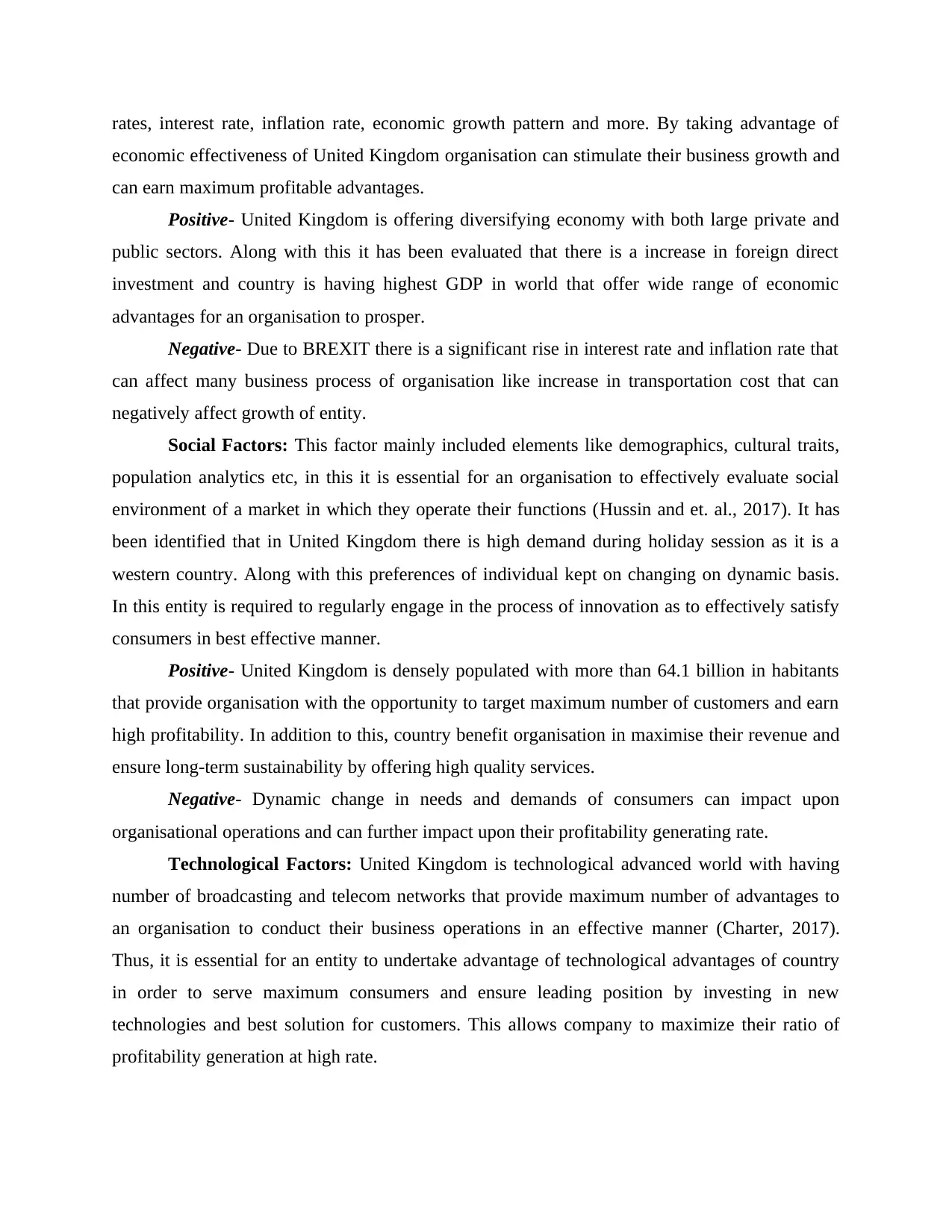
rates, interest rate, inflation rate, economic growth pattern and more. By taking advantage of
economic effectiveness of United Kingdom organisation can stimulate their business growth and
can earn maximum profitable advantages.
Positive- United Kingdom is offering diversifying economy with both large private and
public sectors. Along with this it has been evaluated that there is a increase in foreign direct
investment and country is having highest GDP in world that offer wide range of economic
advantages for an organisation to prosper.
Negative- Due to BREXIT there is a significant rise in interest rate and inflation rate that
can affect many business process of organisation like increase in transportation cost that can
negatively affect growth of entity.
Social Factors: This factor mainly included elements like demographics, cultural traits,
population analytics etc, in this it is essential for an organisation to effectively evaluate social
environment of a market in which they operate their functions (Hussin and et. al., 2017). It has
been identified that in United Kingdom there is high demand during holiday session as it is a
western country. Along with this preferences of individual kept on changing on dynamic basis.
In this entity is required to regularly engage in the process of innovation as to effectively satisfy
consumers in best effective manner.
Positive- United Kingdom is densely populated with more than 64.1 billion in habitants
that provide organisation with the opportunity to target maximum number of customers and earn
high profitability. In addition to this, country benefit organisation in maximise their revenue and
ensure long-term sustainability by offering high quality services.
Negative- Dynamic change in needs and demands of consumers can impact upon
organisational operations and can further impact upon their profitability generating rate.
Technological Factors: United Kingdom is technological advanced world with having
number of broadcasting and telecom networks that provide maximum number of advantages to
an organisation to conduct their business operations in an effective manner (Charter, 2017).
Thus, it is essential for an entity to undertake advantage of technological advantages of country
in order to serve maximum consumers and ensure leading position by investing in new
technologies and best solution for customers. This allows company to maximize their ratio of
profitability generation at high rate.
economic effectiveness of United Kingdom organisation can stimulate their business growth and
can earn maximum profitable advantages.
Positive- United Kingdom is offering diversifying economy with both large private and
public sectors. Along with this it has been evaluated that there is a increase in foreign direct
investment and country is having highest GDP in world that offer wide range of economic
advantages for an organisation to prosper.
Negative- Due to BREXIT there is a significant rise in interest rate and inflation rate that
can affect many business process of organisation like increase in transportation cost that can
negatively affect growth of entity.
Social Factors: This factor mainly included elements like demographics, cultural traits,
population analytics etc, in this it is essential for an organisation to effectively evaluate social
environment of a market in which they operate their functions (Hussin and et. al., 2017). It has
been identified that in United Kingdom there is high demand during holiday session as it is a
western country. Along with this preferences of individual kept on changing on dynamic basis.
In this entity is required to regularly engage in the process of innovation as to effectively satisfy
consumers in best effective manner.
Positive- United Kingdom is densely populated with more than 64.1 billion in habitants
that provide organisation with the opportunity to target maximum number of customers and earn
high profitability. In addition to this, country benefit organisation in maximise their revenue and
ensure long-term sustainability by offering high quality services.
Negative- Dynamic change in needs and demands of consumers can impact upon
organisational operations and can further impact upon their profitability generating rate.
Technological Factors: United Kingdom is technological advanced world with having
number of broadcasting and telecom networks that provide maximum number of advantages to
an organisation to conduct their business operations in an effective manner (Charter, 2017).
Thus, it is essential for an entity to undertake advantage of technological advantages of country
in order to serve maximum consumers and ensure leading position by investing in new
technologies and best solution for customers. This allows company to maximize their ratio of
profitability generation at high rate.
Paraphrase This Document
Need a fresh take? Get an instant paraphrase of this document with our AI Paraphraser
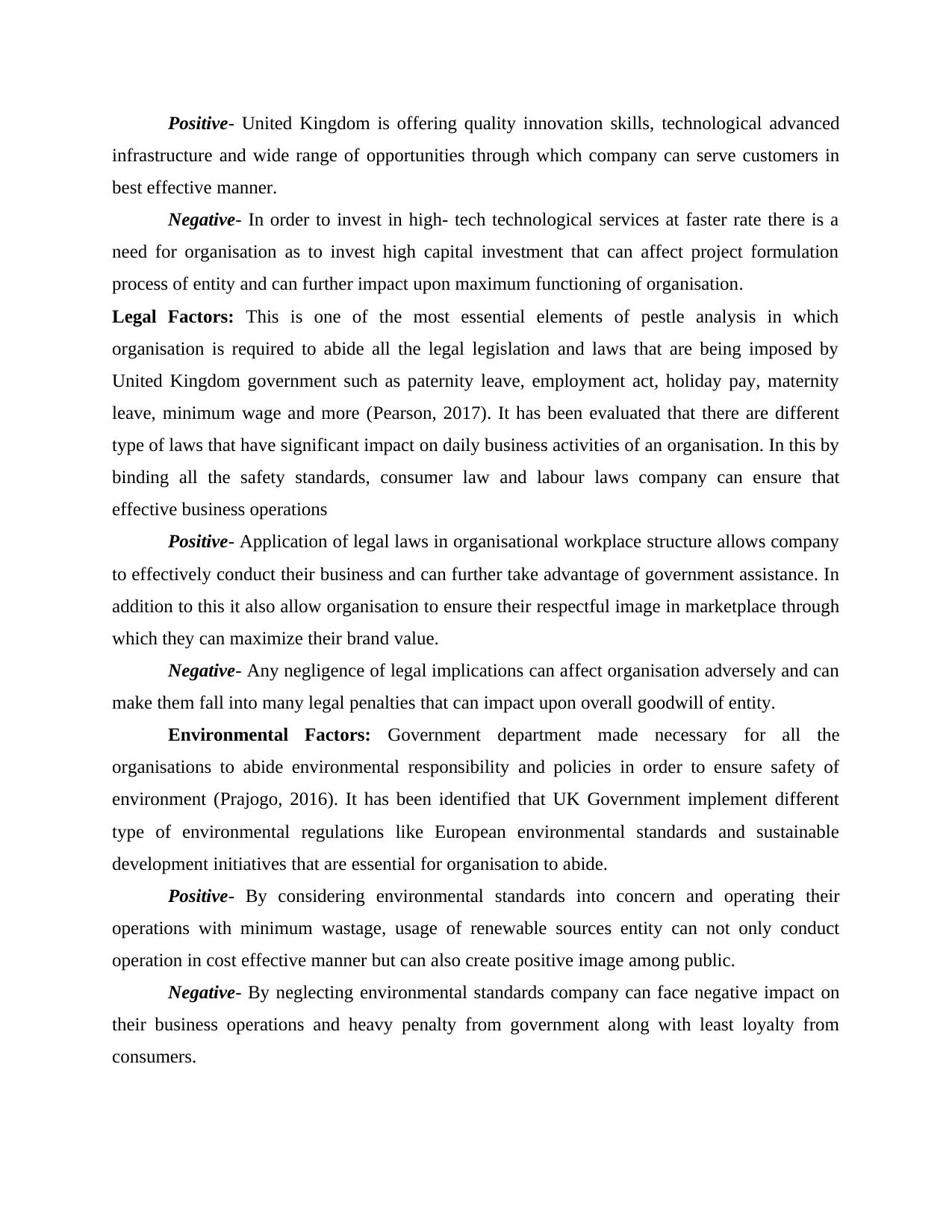
Positive- United Kingdom is offering quality innovation skills, technological advanced
infrastructure and wide range of opportunities through which company can serve customers in
best effective manner.
Negative- In order to invest in high- tech technological services at faster rate there is a
need for organisation as to invest high capital investment that can affect project formulation
process of entity and can further impact upon maximum functioning of organisation.
Legal Factors: This is one of the most essential elements of pestle analysis in which
organisation is required to abide all the legal legislation and laws that are being imposed by
United Kingdom government such as paternity leave, employment act, holiday pay, maternity
leave, minimum wage and more (Pearson, 2017). It has been evaluated that there are different
type of laws that have significant impact on daily business activities of an organisation. In this by
binding all the safety standards, consumer law and labour laws company can ensure that
effective business operations
Positive- Application of legal laws in organisational workplace structure allows company
to effectively conduct their business and can further take advantage of government assistance. In
addition to this it also allow organisation to ensure their respectful image in marketplace through
which they can maximize their brand value.
Negative- Any negligence of legal implications can affect organisation adversely and can
make them fall into many legal penalties that can impact upon overall goodwill of entity.
Environmental Factors: Government department made necessary for all the
organisations to abide environmental responsibility and policies in order to ensure safety of
environment (Prajogo, 2016). It has been identified that UK Government implement different
type of environmental regulations like European environmental standards and sustainable
development initiatives that are essential for organisation to abide.
Positive- By considering environmental standards into concern and operating their
operations with minimum wastage, usage of renewable sources entity can not only conduct
operation in cost effective manner but can also create positive image among public.
Negative- By neglecting environmental standards company can face negative impact on
their business operations and heavy penalty from government along with least loyalty from
consumers.
infrastructure and wide range of opportunities through which company can serve customers in
best effective manner.
Negative- In order to invest in high- tech technological services at faster rate there is a
need for organisation as to invest high capital investment that can affect project formulation
process of entity and can further impact upon maximum functioning of organisation.
Legal Factors: This is one of the most essential elements of pestle analysis in which
organisation is required to abide all the legal legislation and laws that are being imposed by
United Kingdom government such as paternity leave, employment act, holiday pay, maternity
leave, minimum wage and more (Pearson, 2017). It has been evaluated that there are different
type of laws that have significant impact on daily business activities of an organisation. In this by
binding all the safety standards, consumer law and labour laws company can ensure that
effective business operations
Positive- Application of legal laws in organisational workplace structure allows company
to effectively conduct their business and can further take advantage of government assistance. In
addition to this it also allow organisation to ensure their respectful image in marketplace through
which they can maximize their brand value.
Negative- Any negligence of legal implications can affect organisation adversely and can
make them fall into many legal penalties that can impact upon overall goodwill of entity.
Environmental Factors: Government department made necessary for all the
organisations to abide environmental responsibility and policies in order to ensure safety of
environment (Prajogo, 2016). It has been identified that UK Government implement different
type of environmental regulations like European environmental standards and sustainable
development initiatives that are essential for organisation to abide.
Positive- By considering environmental standards into concern and operating their
operations with minimum wastage, usage of renewable sources entity can not only conduct
operation in cost effective manner but can also create positive image among public.
Negative- By neglecting environmental standards company can face negative impact on
their business operations and heavy penalty from government along with least loyalty from
consumers.
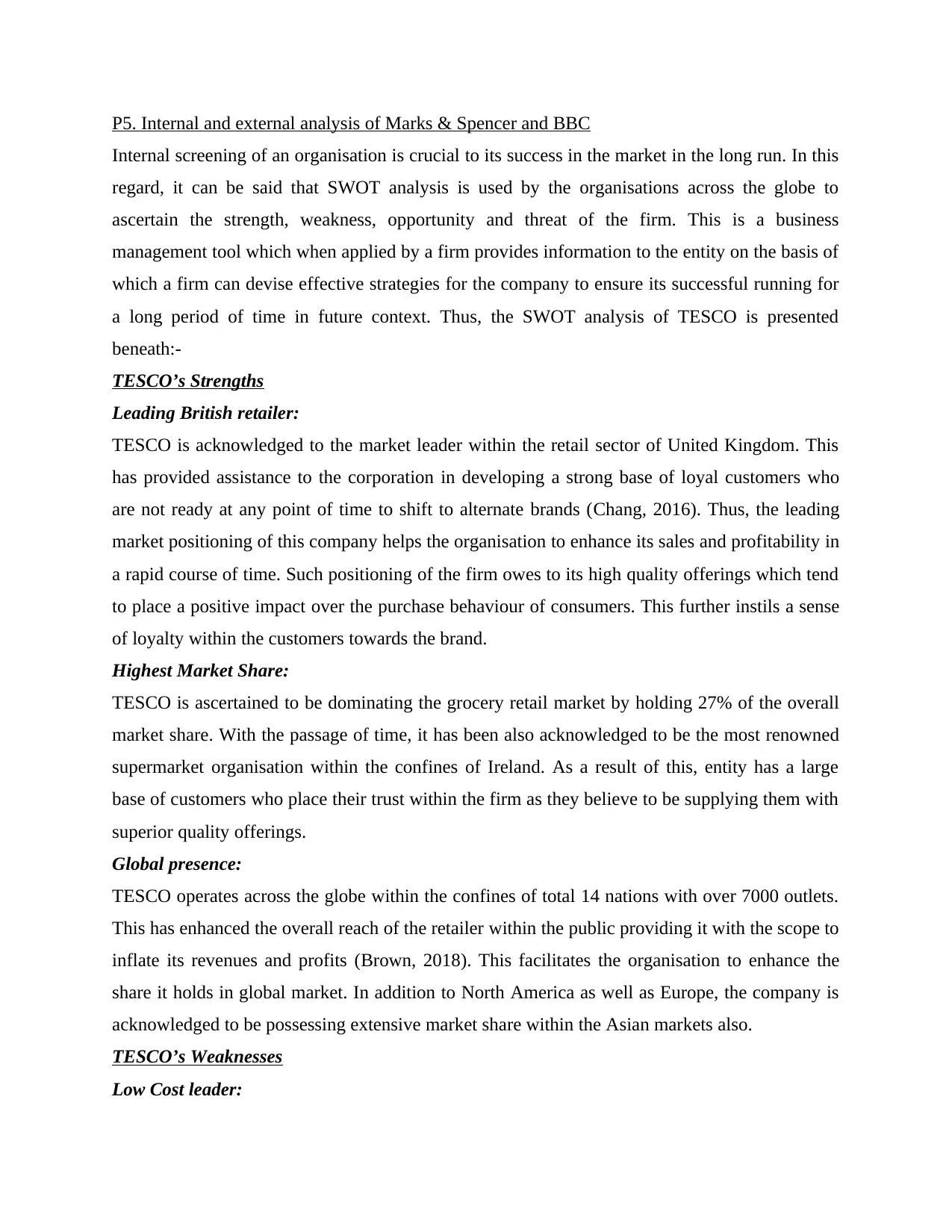
P5. Internal and external analysis of Marks & Spencer and BBC
Internal screening of an organisation is crucial to its success in the market in the long run. In this
regard, it can be said that SWOT analysis is used by the organisations across the globe to
ascertain the strength, weakness, opportunity and threat of the firm. This is a business
management tool which when applied by a firm provides information to the entity on the basis of
which a firm can devise effective strategies for the company to ensure its successful running for
a long period of time in future context. Thus, the SWOT analysis of TESCO is presented
beneath:-
TESCO’s Strengths
Leading British retailer:
TESCO is acknowledged to the market leader within the retail sector of United Kingdom. This
has provided assistance to the corporation in developing a strong base of loyal customers who
are not ready at any point of time to shift to alternate brands (Chang, 2016). Thus, the leading
market positioning of this company helps the organisation to enhance its sales and profitability in
a rapid course of time. Such positioning of the firm owes to its high quality offerings which tend
to place a positive impact over the purchase behaviour of consumers. This further instils a sense
of loyalty within the customers towards the brand.
Highest Market Share:
TESCO is ascertained to be dominating the grocery retail market by holding 27% of the overall
market share. With the passage of time, it has been also acknowledged to be the most renowned
supermarket organisation within the confines of Ireland. As a result of this, entity has a large
base of customers who place their trust within the firm as they believe to be supplying them with
superior quality offerings.
Global presence:
TESCO operates across the globe within the confines of total 14 nations with over 7000 outlets.
This has enhanced the overall reach of the retailer within the public providing it with the scope to
inflate its revenues and profits (Brown, 2018). This facilitates the organisation to enhance the
share it holds in global market. In addition to North America as well as Europe, the company is
acknowledged to be possessing extensive market share within the Asian markets also.
TESCO’s Weaknesses
Low Cost leader:
Internal screening of an organisation is crucial to its success in the market in the long run. In this
regard, it can be said that SWOT analysis is used by the organisations across the globe to
ascertain the strength, weakness, opportunity and threat of the firm. This is a business
management tool which when applied by a firm provides information to the entity on the basis of
which a firm can devise effective strategies for the company to ensure its successful running for
a long period of time in future context. Thus, the SWOT analysis of TESCO is presented
beneath:-
TESCO’s Strengths
Leading British retailer:
TESCO is acknowledged to the market leader within the retail sector of United Kingdom. This
has provided assistance to the corporation in developing a strong base of loyal customers who
are not ready at any point of time to shift to alternate brands (Chang, 2016). Thus, the leading
market positioning of this company helps the organisation to enhance its sales and profitability in
a rapid course of time. Such positioning of the firm owes to its high quality offerings which tend
to place a positive impact over the purchase behaviour of consumers. This further instils a sense
of loyalty within the customers towards the brand.
Highest Market Share:
TESCO is ascertained to be dominating the grocery retail market by holding 27% of the overall
market share. With the passage of time, it has been also acknowledged to be the most renowned
supermarket organisation within the confines of Ireland. As a result of this, entity has a large
base of customers who place their trust within the firm as they believe to be supplying them with
superior quality offerings.
Global presence:
TESCO operates across the globe within the confines of total 14 nations with over 7000 outlets.
This has enhanced the overall reach of the retailer within the public providing it with the scope to
inflate its revenues and profits (Brown, 2018). This facilitates the organisation to enhance the
share it holds in global market. In addition to North America as well as Europe, the company is
acknowledged to be possessing extensive market share within the Asian markets also.
TESCO’s Weaknesses
Low Cost leader:
⊘ This is a preview!⊘
Do you want full access?
Subscribe today to unlock all pages.

Trusted by 1+ million students worldwide
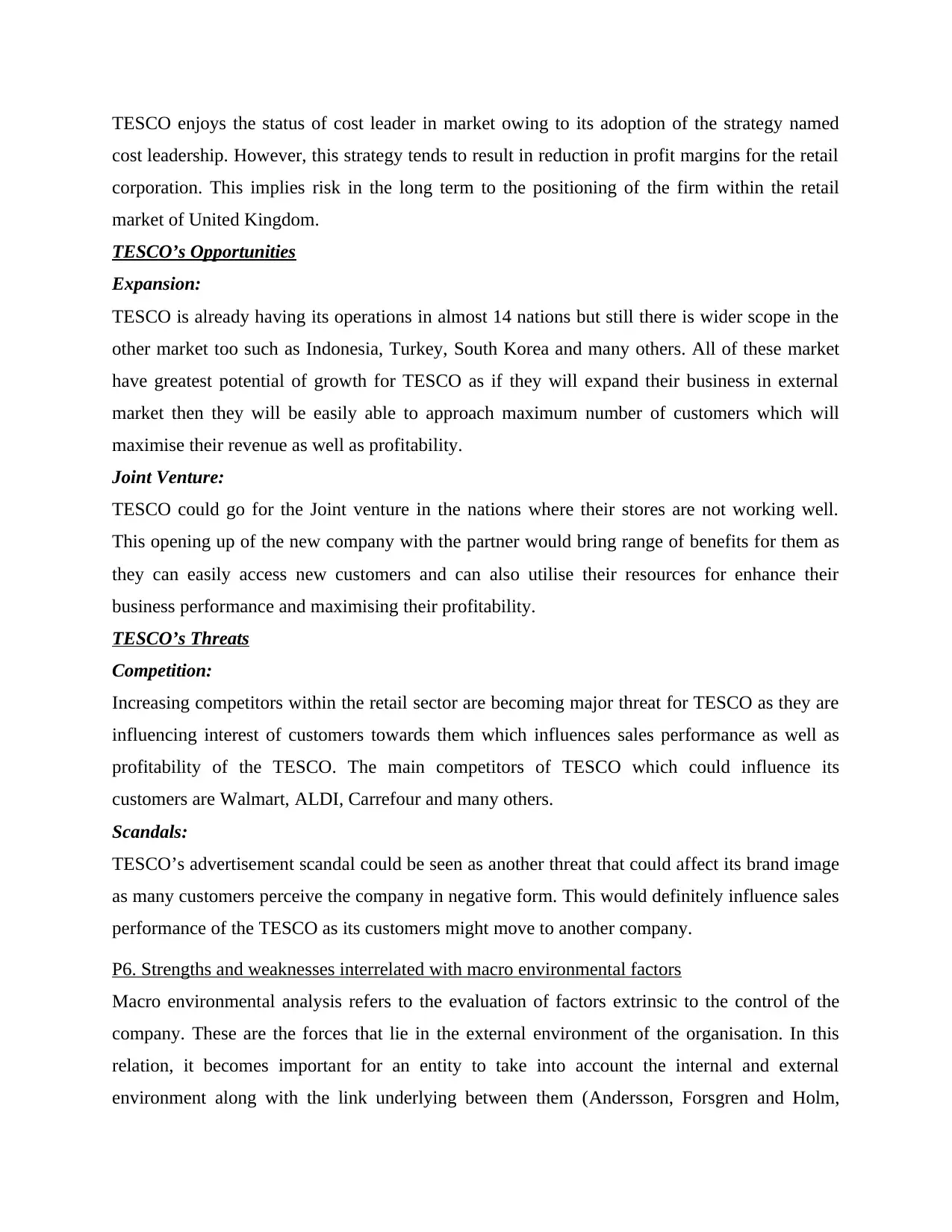
TESCO enjoys the status of cost leader in market owing to its adoption of the strategy named
cost leadership. However, this strategy tends to result in reduction in profit margins for the retail
corporation. This implies risk in the long term to the positioning of the firm within the retail
market of United Kingdom.
TESCO’s Opportunities
Expansion:
TESCO is already having its operations in almost 14 nations but still there is wider scope in the
other market too such as Indonesia, Turkey, South Korea and many others. All of these market
have greatest potential of growth for TESCO as if they will expand their business in external
market then they will be easily able to approach maximum number of customers which will
maximise their revenue as well as profitability.
Joint Venture:
TESCO could go for the Joint venture in the nations where their stores are not working well.
This opening up of the new company with the partner would bring range of benefits for them as
they can easily access new customers and can also utilise their resources for enhance their
business performance and maximising their profitability.
TESCO’s Threats
Competition:
Increasing competitors within the retail sector are becoming major threat for TESCO as they are
influencing interest of customers towards them which influences sales performance as well as
profitability of the TESCO. The main competitors of TESCO which could influence its
customers are Walmart, ALDI, Carrefour and many others.
Scandals:
TESCO’s advertisement scandal could be seen as another threat that could affect its brand image
as many customers perceive the company in negative form. This would definitely influence sales
performance of the TESCO as its customers might move to another company.
P6. Strengths and weaknesses interrelated with macro environmental factors
Macro environmental analysis refers to the evaluation of factors extrinsic to the control of the
company. These are the forces that lie in the external environment of the organisation. In this
relation, it becomes important for an entity to take into account the internal and external
environment along with the link underlying between them (Andersson, Forsgren and Holm,
cost leadership. However, this strategy tends to result in reduction in profit margins for the retail
corporation. This implies risk in the long term to the positioning of the firm within the retail
market of United Kingdom.
TESCO’s Opportunities
Expansion:
TESCO is already having its operations in almost 14 nations but still there is wider scope in the
other market too such as Indonesia, Turkey, South Korea and many others. All of these market
have greatest potential of growth for TESCO as if they will expand their business in external
market then they will be easily able to approach maximum number of customers which will
maximise their revenue as well as profitability.
Joint Venture:
TESCO could go for the Joint venture in the nations where their stores are not working well.
This opening up of the new company with the partner would bring range of benefits for them as
they can easily access new customers and can also utilise their resources for enhance their
business performance and maximising their profitability.
TESCO’s Threats
Competition:
Increasing competitors within the retail sector are becoming major threat for TESCO as they are
influencing interest of customers towards them which influences sales performance as well as
profitability of the TESCO. The main competitors of TESCO which could influence its
customers are Walmart, ALDI, Carrefour and many others.
Scandals:
TESCO’s advertisement scandal could be seen as another threat that could affect its brand image
as many customers perceive the company in negative form. This would definitely influence sales
performance of the TESCO as its customers might move to another company.
P6. Strengths and weaknesses interrelated with macro environmental factors
Macro environmental analysis refers to the evaluation of factors extrinsic to the control of the
company. These are the forces that lie in the external environment of the organisation. In this
relation, it becomes important for an entity to take into account the internal and external
environment along with the link underlying between them (Andersson, Forsgren and Holm,
Paraphrase This Document
Need a fresh take? Get an instant paraphrase of this document with our AI Paraphraser
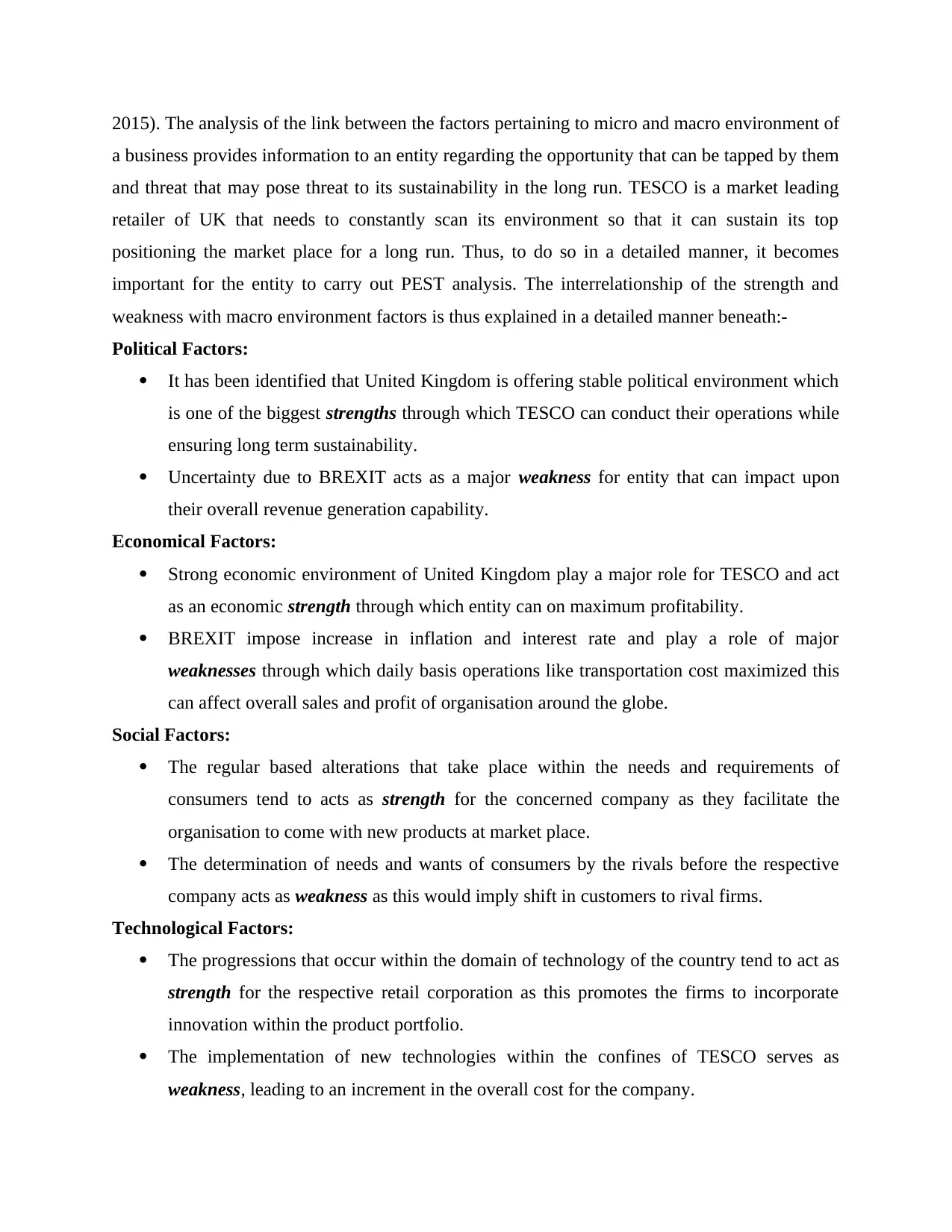
2015). The analysis of the link between the factors pertaining to micro and macro environment of
a business provides information to an entity regarding the opportunity that can be tapped by them
and threat that may pose threat to its sustainability in the long run. TESCO is a market leading
retailer of UK that needs to constantly scan its environment so that it can sustain its top
positioning the market place for a long run. Thus, to do so in a detailed manner, it becomes
important for the entity to carry out PEST analysis. The interrelationship of the strength and
weakness with macro environment factors is thus explained in a detailed manner beneath:-
Political Factors:
It has been identified that United Kingdom is offering stable political environment which
is one of the biggest strengths through which TESCO can conduct their operations while
ensuring long term sustainability.
Uncertainty due to BREXIT acts as a major weakness for entity that can impact upon
their overall revenue generation capability.
Economical Factors:
Strong economic environment of United Kingdom play a major role for TESCO and act
as an economic strength through which entity can on maximum profitability.
BREXIT impose increase in inflation and interest rate and play a role of major
weaknesses through which daily basis operations like transportation cost maximized this
can affect overall sales and profit of organisation around the globe.
Social Factors:
The regular based alterations that take place within the needs and requirements of
consumers tend to acts as strength for the concerned company as they facilitate the
organisation to come with new products at market place.
The determination of needs and wants of consumers by the rivals before the respective
company acts as weakness as this would imply shift in customers to rival firms.
Technological Factors:
The progressions that occur within the domain of technology of the country tend to act as
strength for the respective retail corporation as this promotes the firms to incorporate
innovation within the product portfolio.
The implementation of new technologies within the confines of TESCO serves as
weakness, leading to an increment in the overall cost for the company.
a business provides information to an entity regarding the opportunity that can be tapped by them
and threat that may pose threat to its sustainability in the long run. TESCO is a market leading
retailer of UK that needs to constantly scan its environment so that it can sustain its top
positioning the market place for a long run. Thus, to do so in a detailed manner, it becomes
important for the entity to carry out PEST analysis. The interrelationship of the strength and
weakness with macro environment factors is thus explained in a detailed manner beneath:-
Political Factors:
It has been identified that United Kingdom is offering stable political environment which
is one of the biggest strengths through which TESCO can conduct their operations while
ensuring long term sustainability.
Uncertainty due to BREXIT acts as a major weakness for entity that can impact upon
their overall revenue generation capability.
Economical Factors:
Strong economic environment of United Kingdom play a major role for TESCO and act
as an economic strength through which entity can on maximum profitability.
BREXIT impose increase in inflation and interest rate and play a role of major
weaknesses through which daily basis operations like transportation cost maximized this
can affect overall sales and profit of organisation around the globe.
Social Factors:
The regular based alterations that take place within the needs and requirements of
consumers tend to acts as strength for the concerned company as they facilitate the
organisation to come with new products at market place.
The determination of needs and wants of consumers by the rivals before the respective
company acts as weakness as this would imply shift in customers to rival firms.
Technological Factors:
The progressions that occur within the domain of technology of the country tend to act as
strength for the respective retail corporation as this promotes the firms to incorporate
innovation within the product portfolio.
The implementation of new technologies within the confines of TESCO serves as
weakness, leading to an increment in the overall cost for the company.
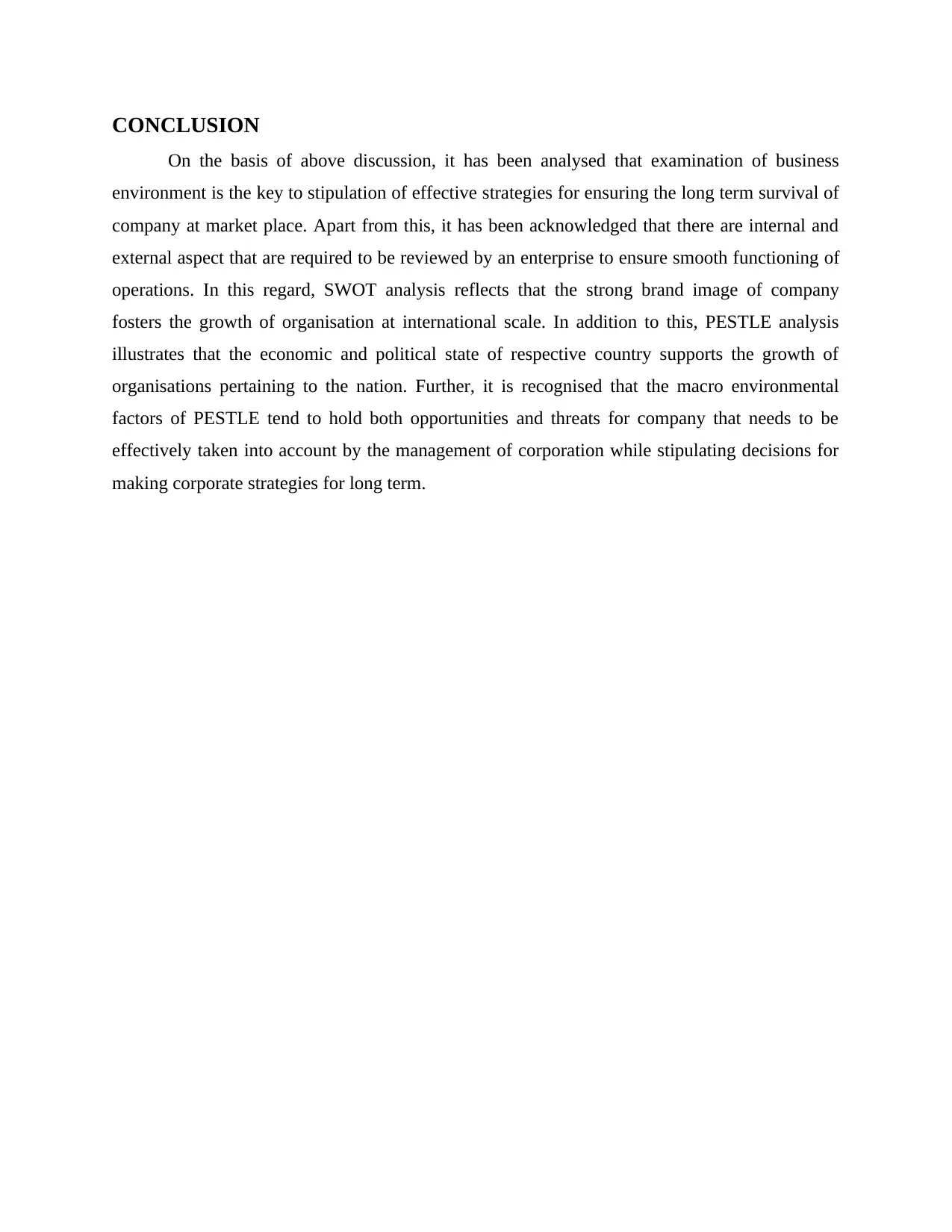
CONCLUSION
On the basis of above discussion, it has been analysed that examination of business
environment is the key to stipulation of effective strategies for ensuring the long term survival of
company at market place. Apart from this, it has been acknowledged that there are internal and
external aspect that are required to be reviewed by an enterprise to ensure smooth functioning of
operations. In this regard, SWOT analysis reflects that the strong brand image of company
fosters the growth of organisation at international scale. In addition to this, PESTLE analysis
illustrates that the economic and political state of respective country supports the growth of
organisations pertaining to the nation. Further, it is recognised that the macro environmental
factors of PESTLE tend to hold both opportunities and threats for company that needs to be
effectively taken into account by the management of corporation while stipulating decisions for
making corporate strategies for long term.
On the basis of above discussion, it has been analysed that examination of business
environment is the key to stipulation of effective strategies for ensuring the long term survival of
company at market place. Apart from this, it has been acknowledged that there are internal and
external aspect that are required to be reviewed by an enterprise to ensure smooth functioning of
operations. In this regard, SWOT analysis reflects that the strong brand image of company
fosters the growth of organisation at international scale. In addition to this, PESTLE analysis
illustrates that the economic and political state of respective country supports the growth of
organisations pertaining to the nation. Further, it is recognised that the macro environmental
factors of PESTLE tend to hold both opportunities and threats for company that needs to be
effectively taken into account by the management of corporation while stipulating decisions for
making corporate strategies for long term.
⊘ This is a preview!⊘
Do you want full access?
Subscribe today to unlock all pages.

Trusted by 1+ million students worldwide
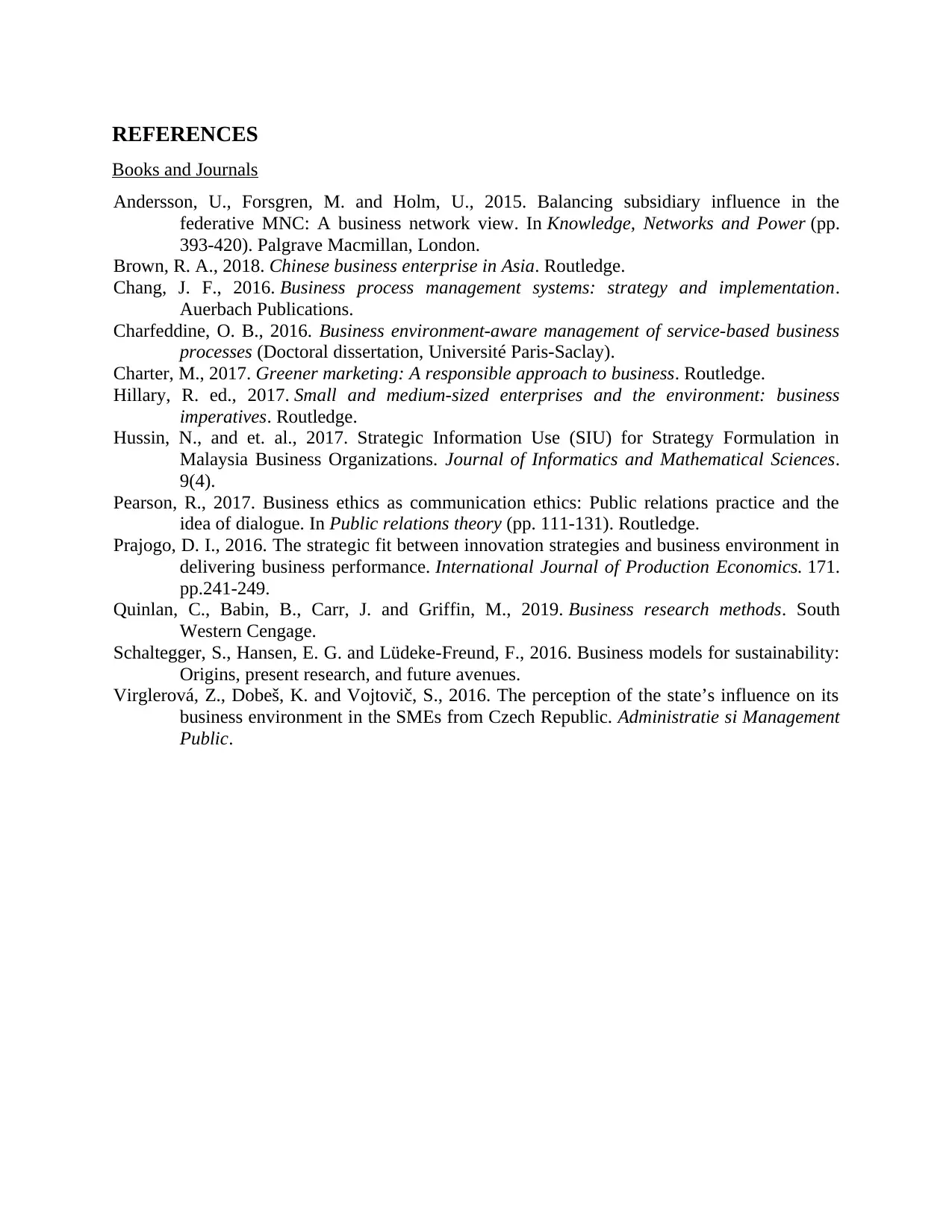
REFERENCES
Books and Journals
Andersson, U., Forsgren, M. and Holm, U., 2015. Balancing subsidiary influence in the
federative MNC: A business network view. In Knowledge, Networks and Power (pp.
393-420). Palgrave Macmillan, London.
Brown, R. A., 2018. Chinese business enterprise in Asia. Routledge.
Chang, J. F., 2016. Business process management systems: strategy and implementation.
Auerbach Publications.
Charfeddine, O. B., 2016. Business environment-aware management of service-based business
processes (Doctoral dissertation, Université Paris-Saclay).
Charter, M., 2017. Greener marketing: A responsible approach to business. Routledge.
Hillary, R. ed., 2017. Small and medium-sized enterprises and the environment: business
imperatives. Routledge.
Hussin, N., and et. al., 2017. Strategic Information Use (SIU) for Strategy Formulation in
Malaysia Business Organizations. Journal of Informatics and Mathematical Sciences.
9(4).
Pearson, R., 2017. Business ethics as communication ethics: Public relations practice and the
idea of dialogue. In Public relations theory (pp. 111-131). Routledge.
Prajogo, D. I., 2016. The strategic fit between innovation strategies and business environment in
delivering business performance. International Journal of Production Economics. 171.
pp.241-249.
Quinlan, C., Babin, B., Carr, J. and Griffin, M., 2019. Business research methods. South
Western Cengage.
Schaltegger, S., Hansen, E. G. and Lüdeke-Freund, F., 2016. Business models for sustainability:
Origins, present research, and future avenues.
Virglerová, Z., Dobeš, K. and Vojtovič, S., 2016. The perception of the state’s influence on its
business environment in the SMEs from Czech Republic. Administratie si Management
Public.
Books and Journals
Andersson, U., Forsgren, M. and Holm, U., 2015. Balancing subsidiary influence in the
federative MNC: A business network view. In Knowledge, Networks and Power (pp.
393-420). Palgrave Macmillan, London.
Brown, R. A., 2018. Chinese business enterprise in Asia. Routledge.
Chang, J. F., 2016. Business process management systems: strategy and implementation.
Auerbach Publications.
Charfeddine, O. B., 2016. Business environment-aware management of service-based business
processes (Doctoral dissertation, Université Paris-Saclay).
Charter, M., 2017. Greener marketing: A responsible approach to business. Routledge.
Hillary, R. ed., 2017. Small and medium-sized enterprises and the environment: business
imperatives. Routledge.
Hussin, N., and et. al., 2017. Strategic Information Use (SIU) for Strategy Formulation in
Malaysia Business Organizations. Journal of Informatics and Mathematical Sciences.
9(4).
Pearson, R., 2017. Business ethics as communication ethics: Public relations practice and the
idea of dialogue. In Public relations theory (pp. 111-131). Routledge.
Prajogo, D. I., 2016. The strategic fit between innovation strategies and business environment in
delivering business performance. International Journal of Production Economics. 171.
pp.241-249.
Quinlan, C., Babin, B., Carr, J. and Griffin, M., 2019. Business research methods. South
Western Cengage.
Schaltegger, S., Hansen, E. G. and Lüdeke-Freund, F., 2016. Business models for sustainability:
Origins, present research, and future avenues.
Virglerová, Z., Dobeš, K. and Vojtovič, S., 2016. The perception of the state’s influence on its
business environment in the SMEs from Czech Republic. Administratie si Management
Public.
1 out of 10
Related Documents
Your All-in-One AI-Powered Toolkit for Academic Success.
+13062052269
info@desklib.com
Available 24*7 on WhatsApp / Email
![[object Object]](/_next/static/media/star-bottom.7253800d.svg)
Unlock your academic potential
Copyright © 2020–2026 A2Z Services. All Rights Reserved. Developed and managed by ZUCOL.




